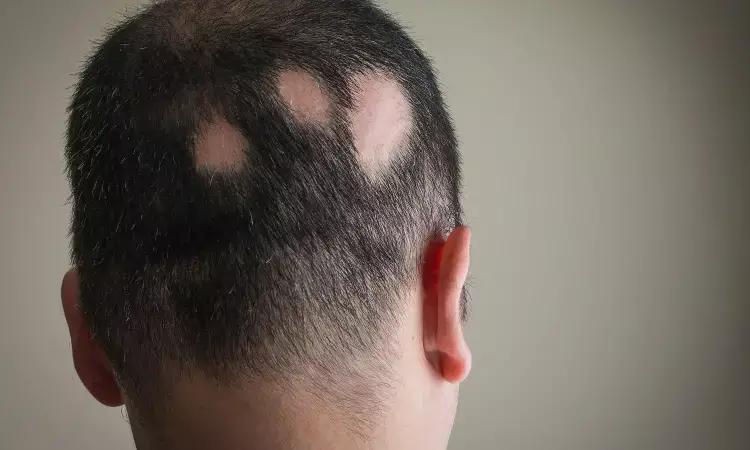Study Finds Significant Rise In Alopecia Areata After COVID-19
- byDoctor News Daily Team
- 02 July, 2025
- 0 Comments
- 0 Mins

South Korea: A nationwide study involving more than half a million South Koreans revealed a significant increase in the incidence of alopecia areata (AA) after COVID-19. The findings from the research letter were published online in JAMA Dermatology on January 10, 2024.
The researchers found an 82% higher incidence of an autoimmune form of hair loss for individuals versus those without a prior COVID infection (43.19 vs 23.61 per 10,000 person-years; adjusted HR 1.82) in a propensity score-matched analysis. In all groups older than 20 years; a higher incidence was seen with greater risk observed both in men and women.
The study also revealed an increased incidence of telogen effluvium -- rapid hair loss triggered by stress or other changes to the body -- among the cohort with COVID-19 compared with the control group (adjusted HR 6.40).
Jong-Seung Kim, Jeonbuk National University Medical School, Jeonju, South Korea, and colleagues add, "These findings support the possible role of COVID-19 in AA [alopecia areata] occurrence and exacerbation, although other environmental factors, such as psychological stress, may have also contributed to AA development during the pandemic."
"Plausible mechanisms of AA following COVID-19 include antigenic molecular mimicry between SARS-CoV-2 and hair follicle autoantigens, bystander activation, and cytokine shifting."
COVID-19 is associated with triggering or exacerbation of various autoimmune diseases, such as rheumatoid arthritis, inflammatory bowel disease, and systemic lupus erythematosus. Alopecia areata is autoimmune hair loss that occurs in susceptible individuals to environmental triggers, such as vaccinations viruses, and psychological stress.
There is a growing number of reports on new onset, exacerbation, and recurrence of alopecia areata after COVID-19. However, evidence is limited to support an association between COVID-19 and AA.
For their propensity score-matched study, the research team used data from the Korea Disease Control and Prevention Agency-COVID-19-National Health Insurance Service cohort from October 2020 through September 2021. The cohort included 259,369 patients with COVID-19 and 259,369 patients without COVID-19. Patients were matched along with comorbidities and demographic characteristics.
The study led to the following findings:
Incidence of patchy alopecia areata or alopecia totalis and alopecia universalis (AT/AU) were higher in patients with COVID, at 35.94 and 7.24 per 10,000 person-years, respectively, as compared with 19.43 and 4.18 per 10,000 person-years among controls.
The prevalence of alopecia areata and AT/AU was 70.53 and 12.39 per 10,000 person-years in the COVID group versus 52.37 and 8.97 per 10,000 person-years in controls.
The age- and sex-adjusted incidence and prevalence of alopecia areata and AT/AU in COVID-19-infected patients were considerably higher than in the pre-pandemic period in Korea, in which incidence and prevalence of AA and AT/AU remained constant from 2006 to 2015.
"There is a need for further studies to validate the association between different populations and elucidate the causal relationship between the two conditions," they concluded.
Reference:
Kim J, Lee G, Jeong C, et al. Risk of Alopecia Areata After COVID-19. JAMA Dermatol. Published online January 10, 2024. doi:10.1001/jamadermatol.2023.5559.
Disclaimer: This website is designed for healthcare professionals and serves solely for informational purposes.
The content provided should not be interpreted as medical advice, diagnosis, treatment recommendations, prescriptions, or endorsements of specific medical practices. It is not a replacement for professional medical consultation or the expertise of a licensed healthcare provider.
Given the ever-evolving nature of medical science, we strive to keep our information accurate and up to date. However, we do not guarantee the completeness or accuracy of the content.
If you come across any inconsistencies, please reach out to us at
admin@doctornewsdaily.com.
We do not support or endorse medical opinions, treatments, or recommendations that contradict the advice of qualified healthcare professionals.
By using this website, you agree to our
Terms of Use,
Privacy Policy, and
Advertisement Policy.
For further details, please review our
Full Disclaimer.
Tags:
Recent News
Pfizer files lawsuit against Metsera, its Director...
- 02 November, 2025
Health Ministry achieves 3 Guinness World Records...
- 02 November, 2025
Roche gets CE mark for Elecsys Dengue Ag test to d...
- 02 November, 2025
Daily Newsletter
Get all the top stories from Blogs to keep track.


0 Comments
Post a comment
No comments yet. Be the first to comment!